“One summit after the other, the use of fossil fuels for energy generation is being threatened by some in the energy transition debate. Those who advocate for climate change, continue to pit fossil fuels against renewable energies, and as a result downplaying the role of fossil fuels in the energy mix, while they exaggerate the role of renewable energies.”
So said the minister of mineral resources and energy, Gwede Mantashe, at the third annual Southern Africa Oil and Gas Conference held at the Cape Town International Convention Centre (CTICC) on Wednesday, 13 September.
Concluding his keynote address, Mantashe said, “All of us — no exceptions — are accepting that we must move from high carbon emissions to low carbon emissions. The debate is about the nature of the journey we must travel.”
Outside the CTICC, activists gathered in their numbers, waving placards and flags, calling for an end to the fossil fuel industry while inside, oil and gas professionals in suits and dresses sipped coffee in auditoriums and chatted about how to expand it.
Minister of Mineral Resources Gwede Mantashe speaks at the Southern Africa Oil and Gas Conference in Cape Town, 13 September 2023. (Photo: Ziyanda Duba)
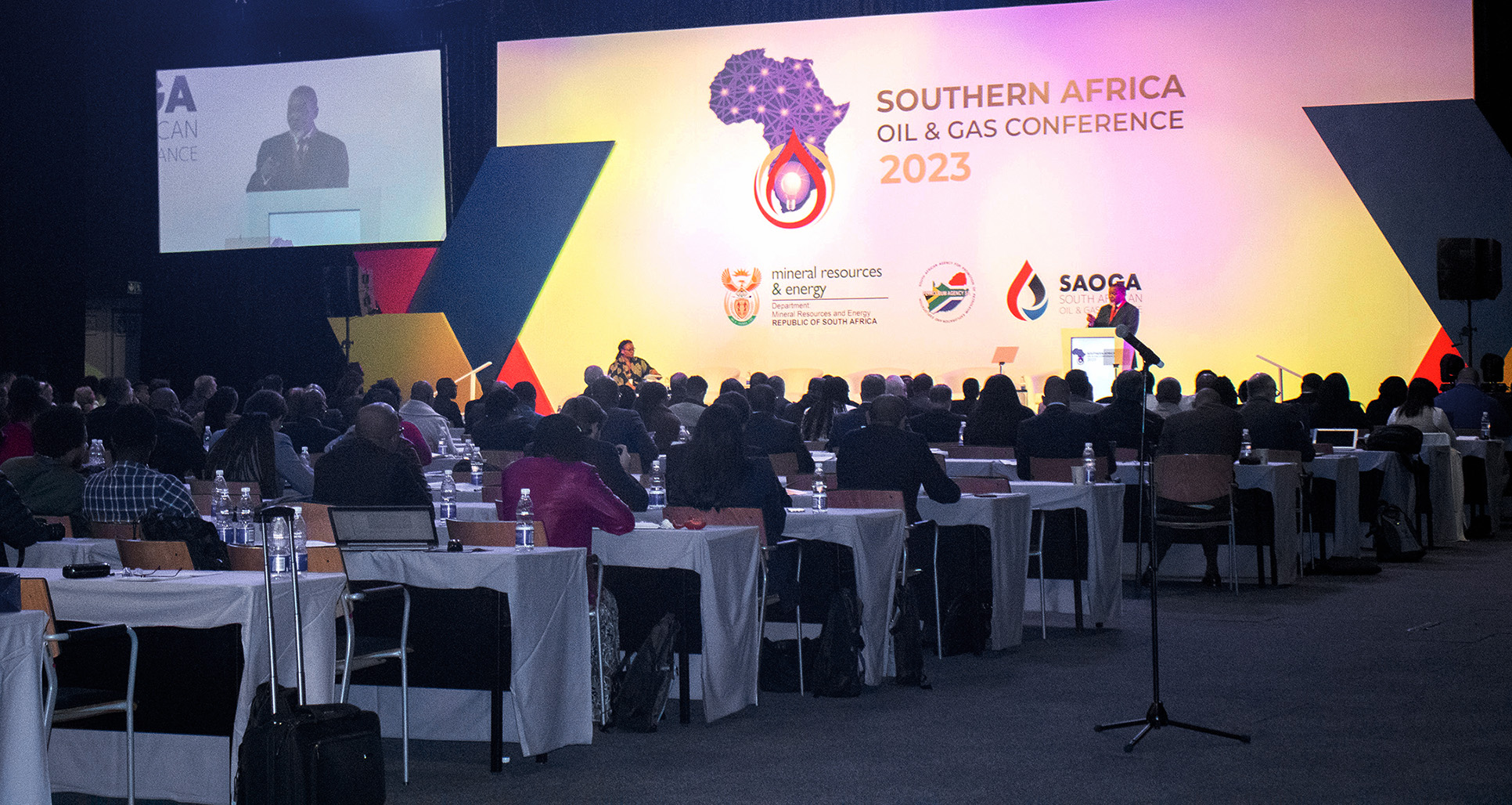
The Southern Africa Oil and Gas Conference in Cape Town, 13 September 2023. (Photo: Ziyanda Duba)
The debate
Representatives of both groups shared their thoughts with Daily Maverick.
Speaking at the conference, Mantashe, whose opinions on the matter are no secret, said that South Africa stood to benefit from the planned R288-billion investments in projects including TotalEnergies’ Brulpadda project in the Western Cape, the Virginia Gas Project in the Free State, the Lephalale Coal Bed project in Limpopo and the Afro Energy project in Amersfoort and Volksrust in Mpumalanga.
The minister, however, neglected to mention the details of how these investments would benefit the ordinary person, particularly in the context of a world wracked by increasingly violent climate impacts.
With a chicken mask atop her head, Judy Scott-Goldman, an activist with Extinction Rebellion, explained how these investments and ones like them would, in her view, not benefit South Africans or the environment.
“All the burning of fossil fuels is really beginning to show [in climate impacts]. It’s causing devastation across the world with floods, droughts, hurricanes, and more. In Libya just yesterday there was a huge flood … It’s causing death and destruction, it’s destroying livelihoods, it’s an enormous economic cost.
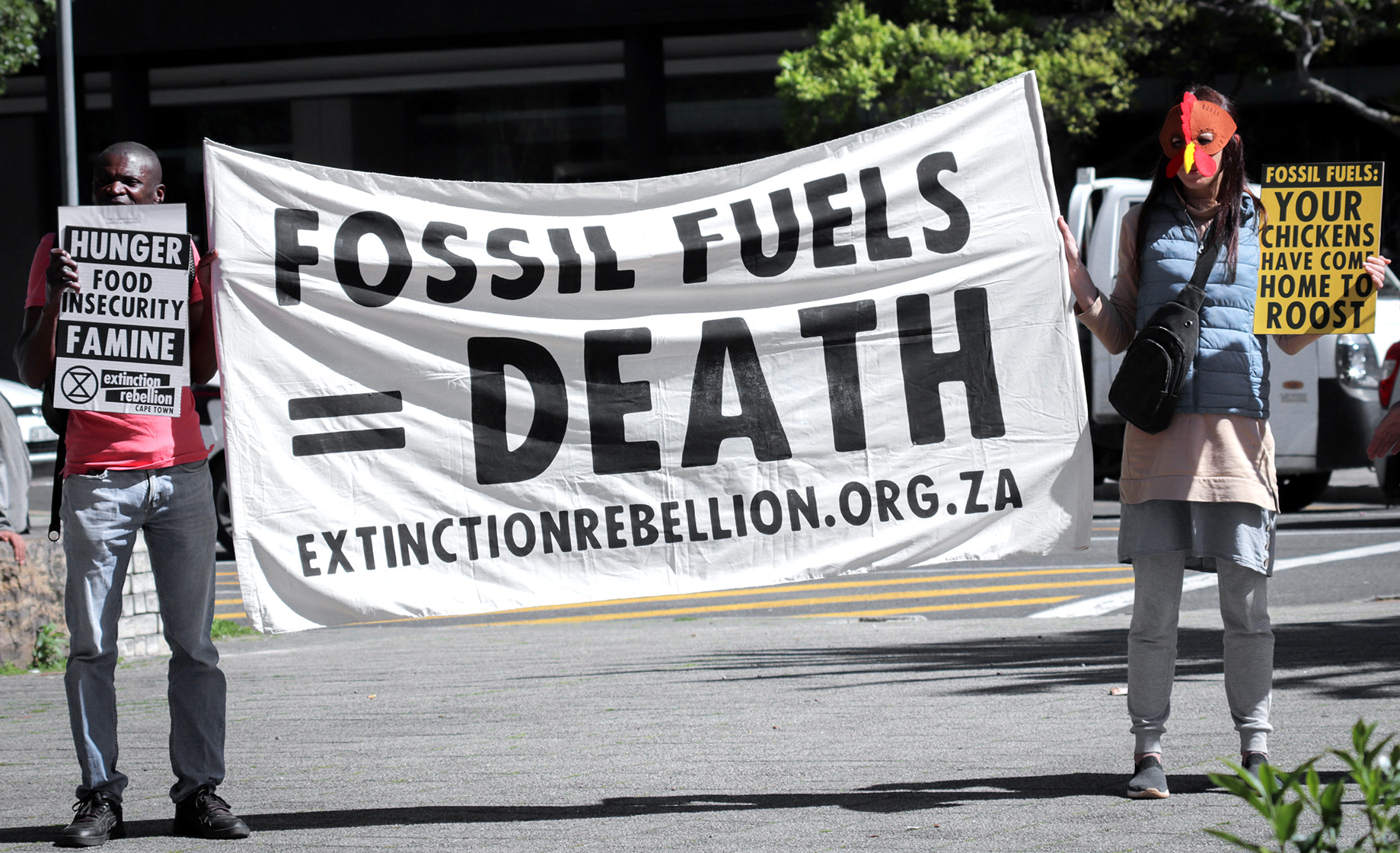
Protesters holding a banner and placards outside the Southern Africa Oil and Gas Conference in Cape Town, 13 September 2023. (Photo: Ziyanda Duba)
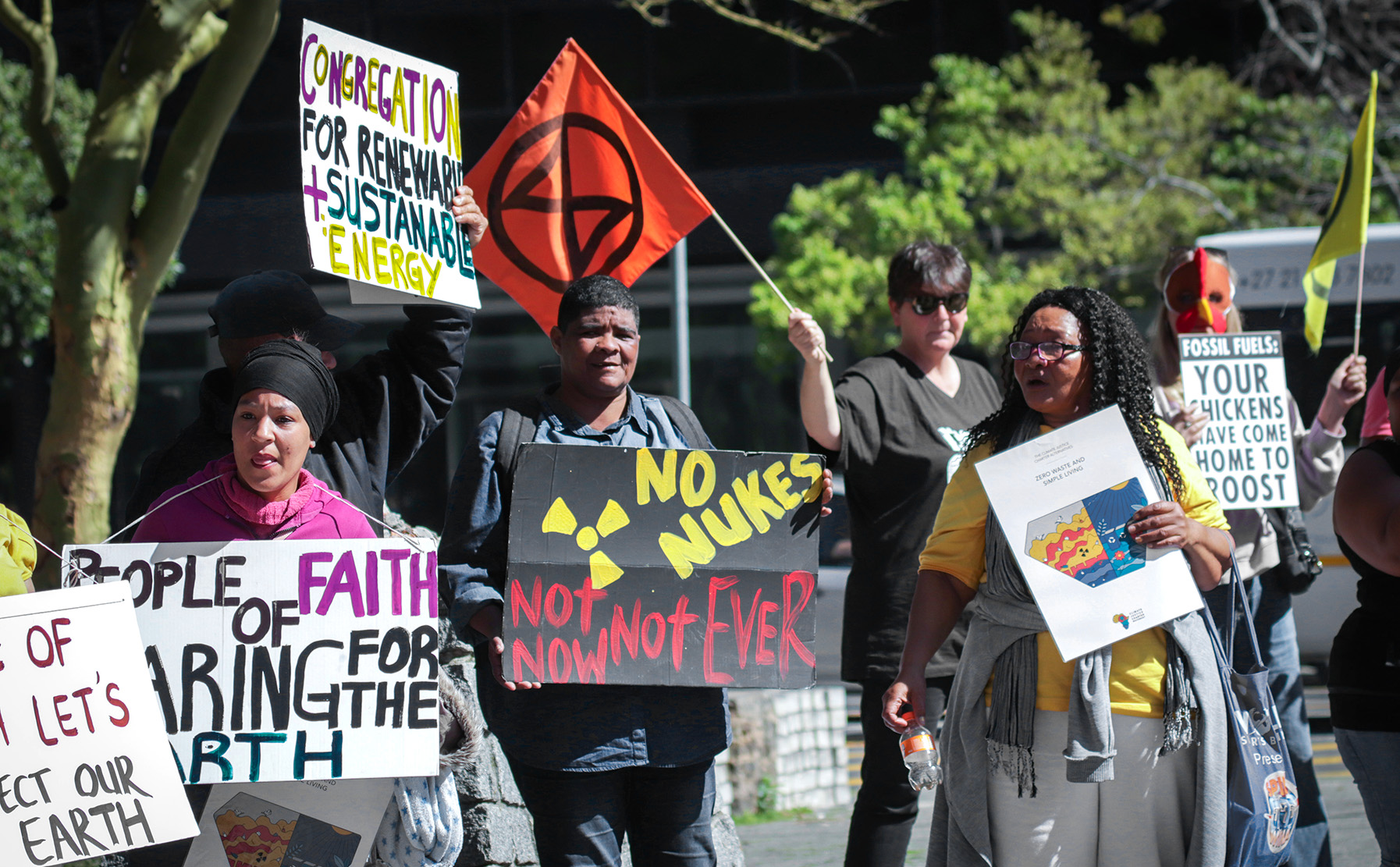
Protesters holding placards outside the Southern Africa Oil and Gas Conference in Cape Town, 13 September 2023. (Photo: Ziyanda Duba)
“Governments of South Africa, Namibia and so on think they’re going to make South Africa wealthy, but if you actually balance out these economic costs now, it’s going to cost way more than what you think you’re going to earn from oil and gas.”
But what of energy security, development and job creation? Are these incongruous with a stable climate? Not according to the Department of Mineral Resources and Energy (DMRE).
Dr Nobuhle Nkabane, DMRE deputy minister, speaking on Wednesday, said that localisation and further development of both discovered and untapped natural gas were key to South Africa achieving its energy and climate commitments.
She said the continued exploration and discovery of indigenous gas “is crucial for meeting our climate change targets and securing of energy supply”, as well as the economic growth of the country.
Adrian Strydom, the CEO of the South Africa Oil and Gas Alliance, said the upstream oil and gas sector could give South Africa energy independence and that as a net importer of oil and gas, South Africa was vulnerable to geopolitical events and oil price fluctuations, which had increasingly been hurting the pockets of South Africans.
But are new fossil fuel investments even necessary to attain energy security or to stave off the impacts of the country’s legacy dependence on hydrocarbons?
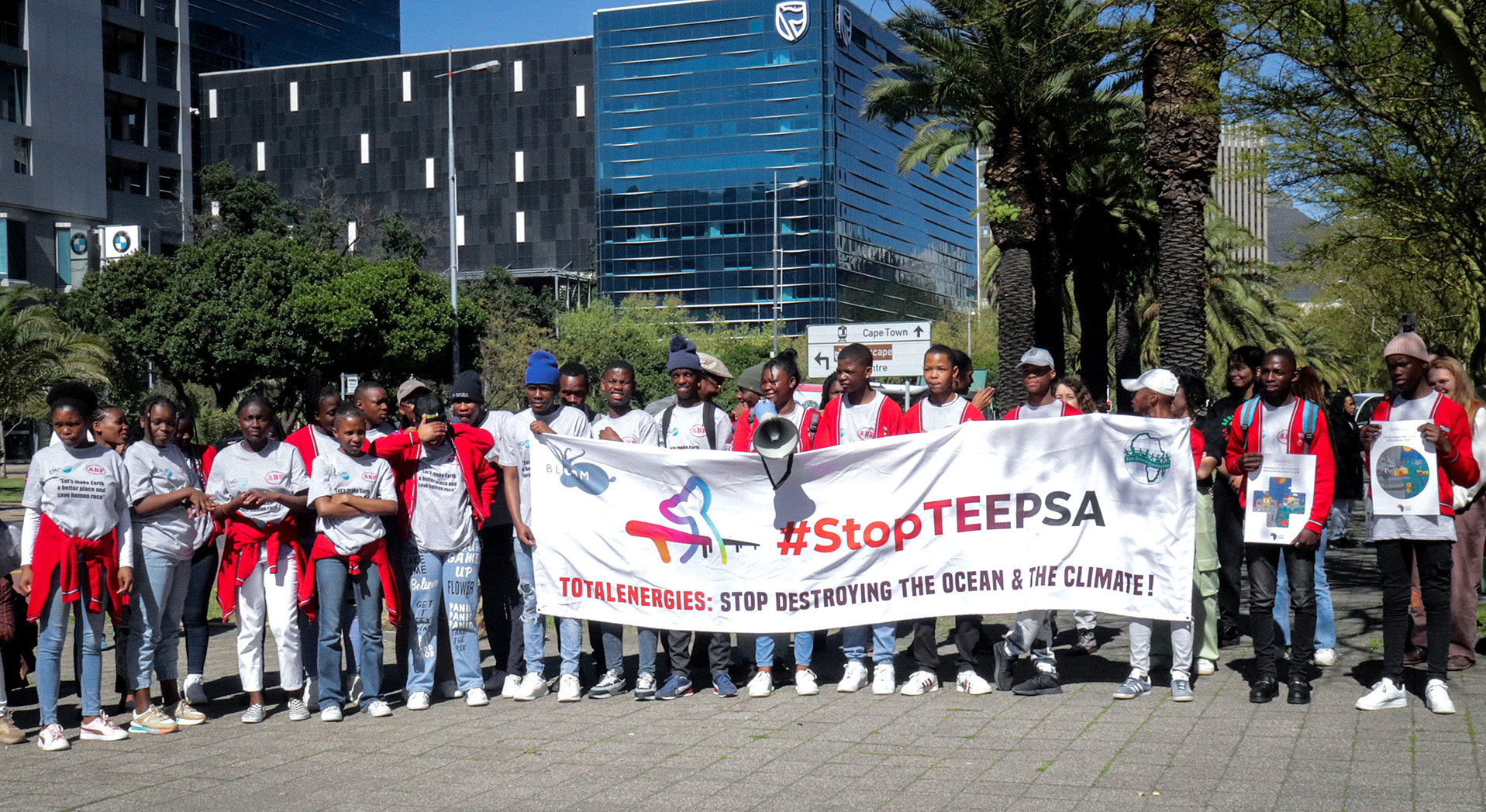
Youth protesters outside the Southern Africa Oil and Gas Conference in Cape Town, 13 September 2023. (Photo: Ziyanda Duba)
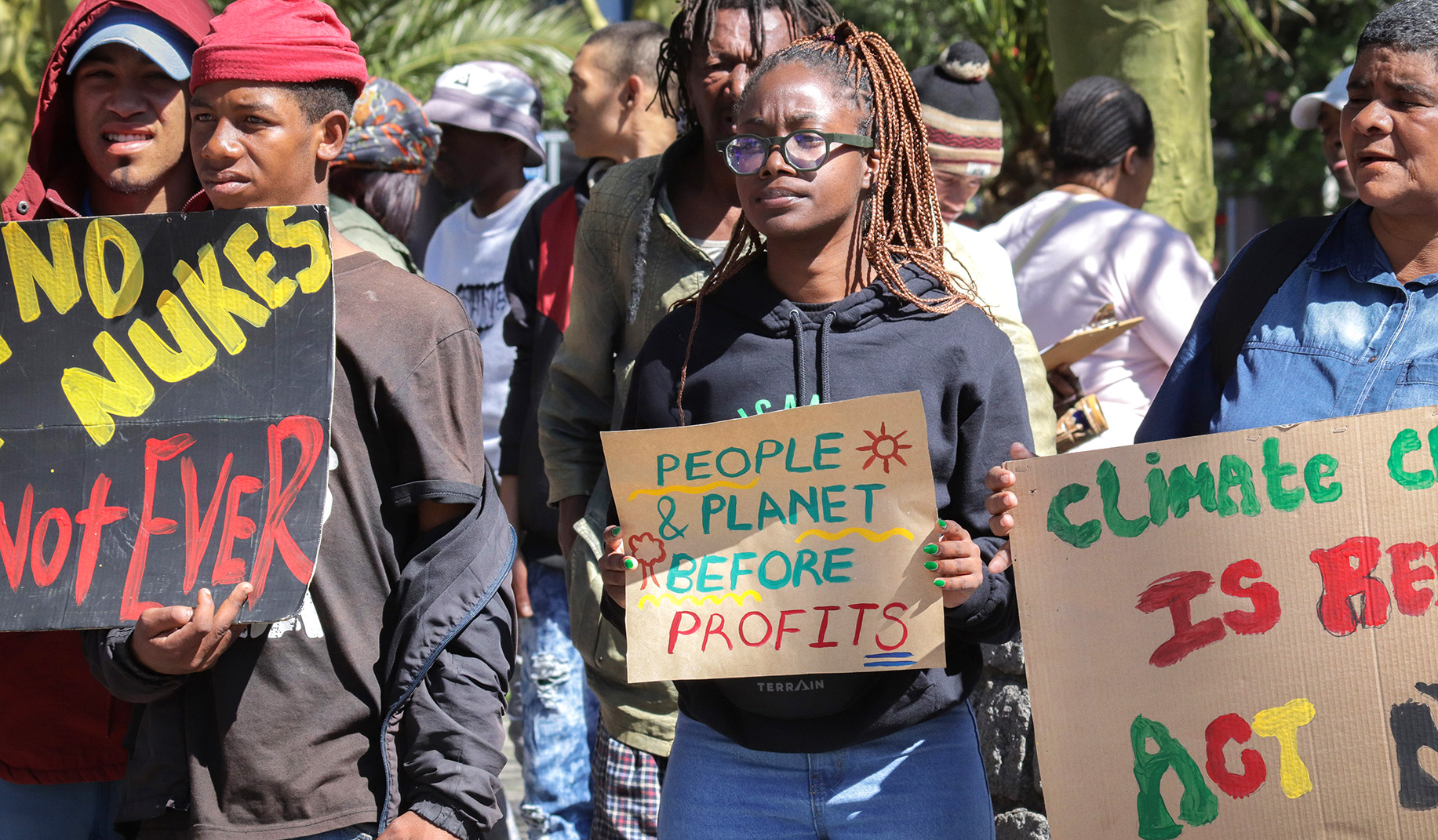
Climate activist protesters outside the Southern Africa Oil and Gas Conference in Cape Town, 13 September 2023. (Photo: Ziyanda Duba)
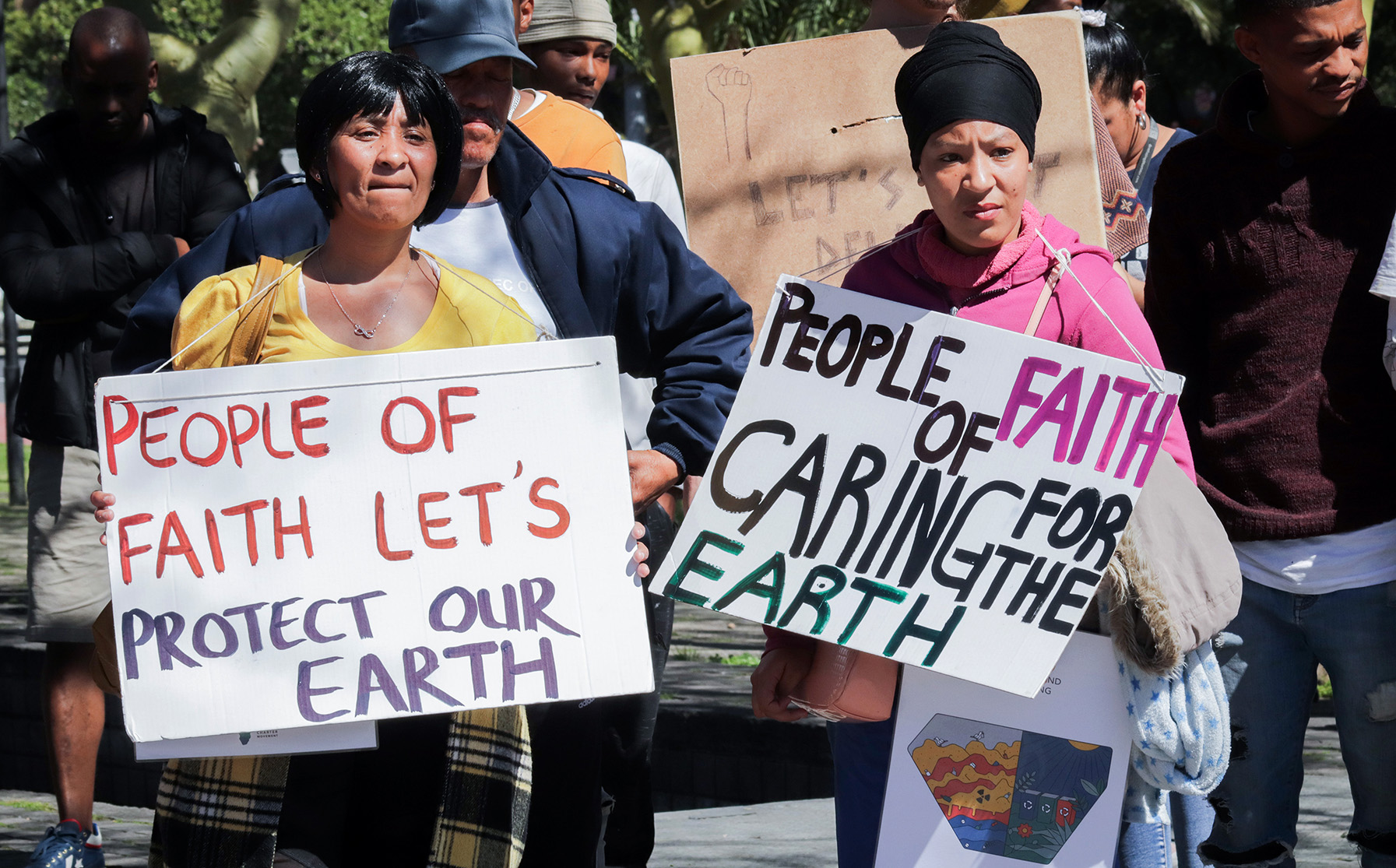
Protesters holding placards outside the Southern Africa Oil and Gas Conference in Cape Town, 13 September 2023. (Photo: Ziyanda Duba)
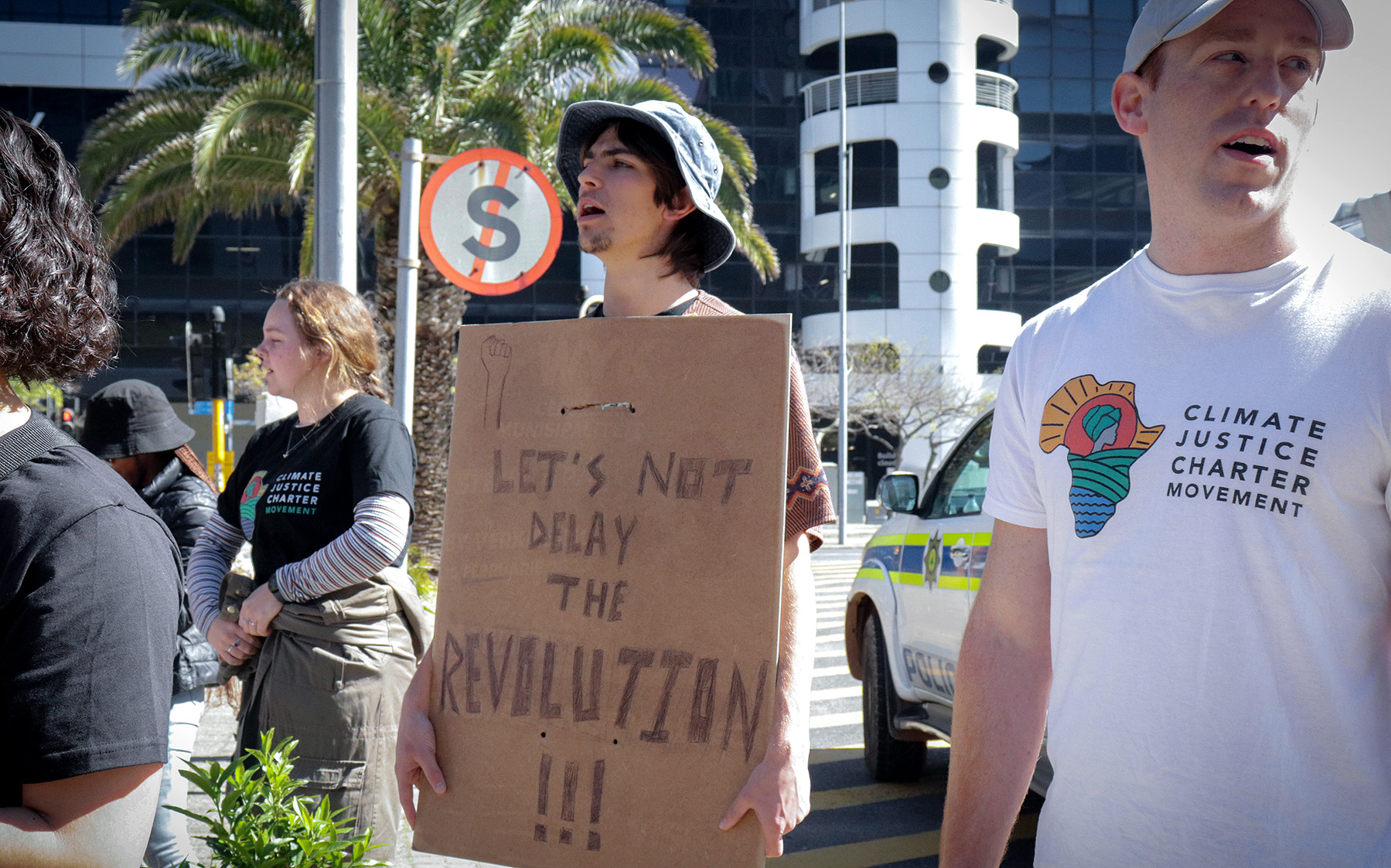
Climate activists call for climate justice outside the Southern Africa Oil and Gas Conference in Cape Town, 13 September 2023. (Photo: Ziyanda Duba)
‘Green jobs’ vs ‘dirty jobs’
Gabriel Klaasen, spokesperson for the African Climate Alliance and Project 90 by 2030, shared his thoughts with Daily Maverick.
“We are calling for the end of fossil fuels, the end of gas and oil, as it is and will continue to destroy lives and livelihoods.”
Klaasen explained that he believes in a truly just transition and that getting people out of pollutive and extractive industries into new positions in “green jobs” is better than creating new “dirty jobs”, not least because renewable energy is faster to bring online than fossil fuel infrastructure, which often takes decades to come online.
The most important message, he said, is that “fossil fuels, oil, gas, coal, are dying industries and unreliable. We see this in load shedding. Renewable energy is not only clean but it is also affordable and it is much more reliable.”
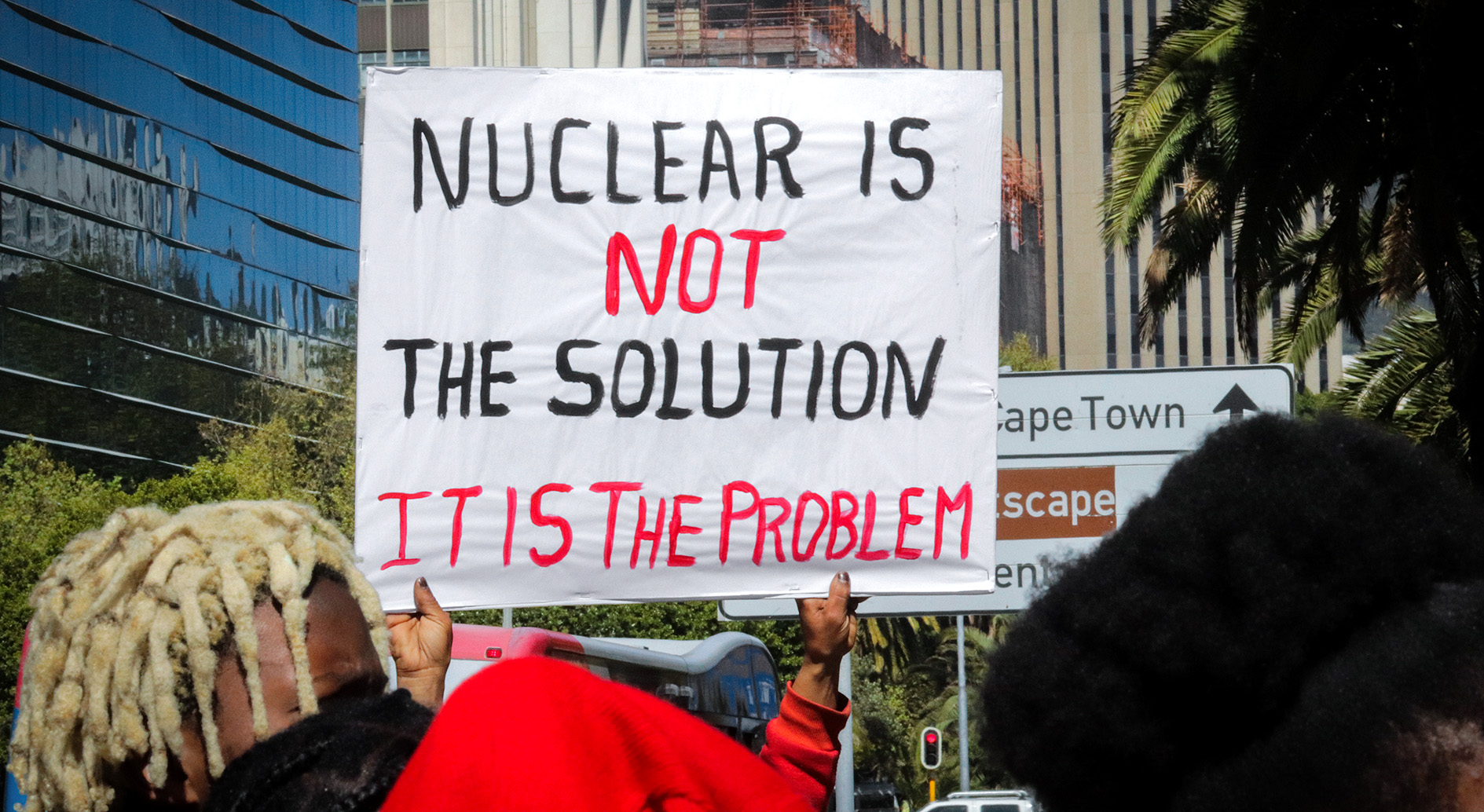
Protesters outside the Southern Africa Oil and Gas Conference in Cape Town, 13 September 2023. (Photo: Ziyanda Duba)
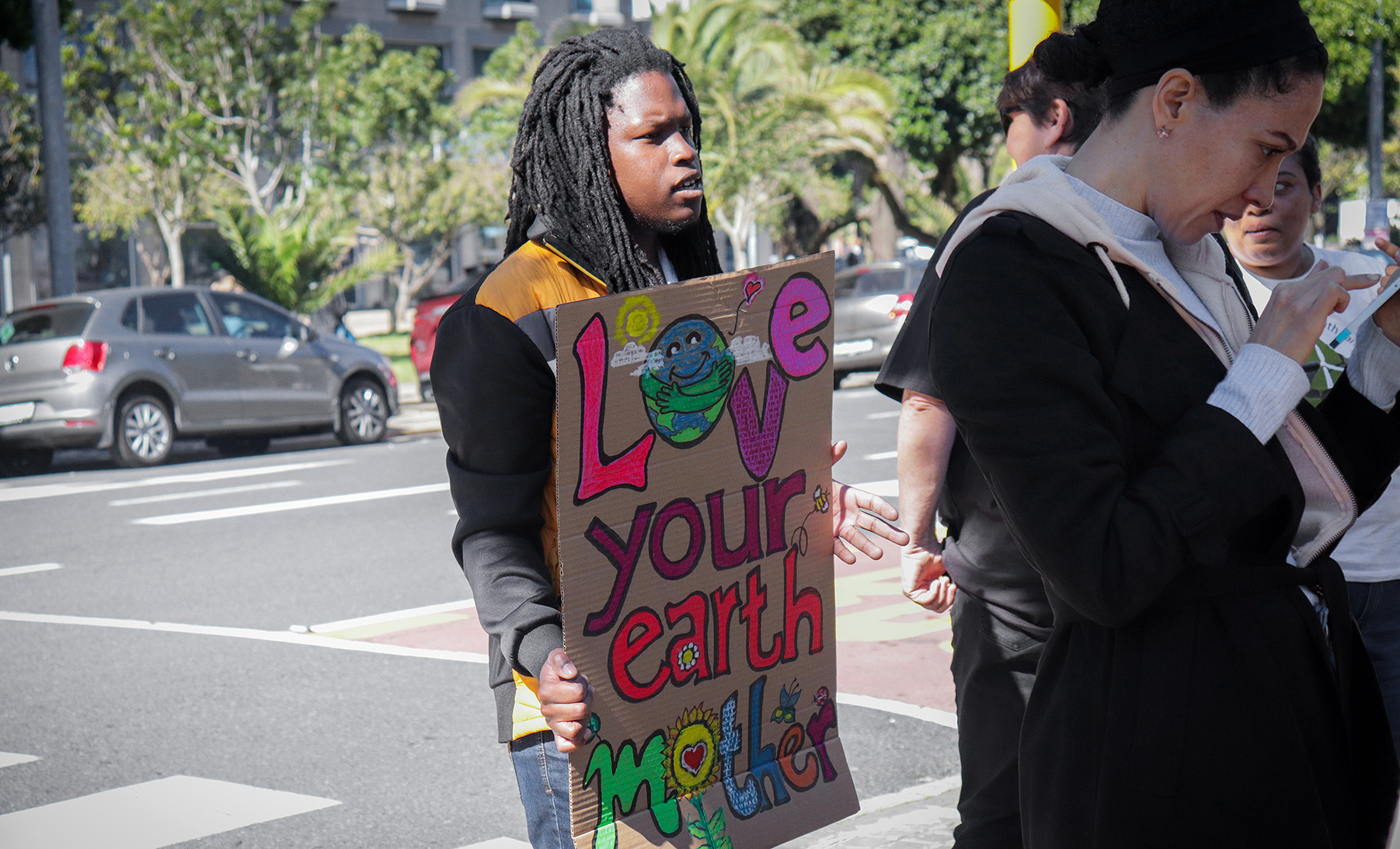
A protester holds a placard calling for climate justice outside the Southern Africa Oil and Gas Conference in Cape Town. 13 September 2023. (Photo: Ziyanda Duba)
In response to the protesters outside and their demands, the acting CEO of the Petroleum Agency SA, Dr Tshepo Mokoka, told Daily Maverick that in this debate there needed to be a separation between the communities affected by explorative oil and gas activities and funded NGOs that might have a particular view that they take to court.
“More space needs to be given for actual communities where these developments will be earmarked to happen, to speak.”
“Communities are saying they want this development. They want the economic activity that comes with it. They want it to be inclusive,” Mokoka said.
Matthew Wingfield, a representative of the Climate Justice Charter, had a different perspective. He said there needs to be clear and deep thought into the kind of employment creation that the oil and gas industry is advocating for and how the communities really feel.
“Who is being made expendable? The people who work in these toxic jobs have no future, they are dying in disproportionate numbers; they’re living in toxic wastelands. The jobs as they would have it are not as positive as they would have us believe,” he said.
“The people that have decided our current moment in South Africa and the [state of the] world don’t care about people and their livelihoods. Certainly not poor people. These [rich and powerful] people will only realise when everything is polluted and the environment is degraded everywhere that this is not a way of living.”
Read more in Daily Maverick: AR6 synthesis report: Warming above 1.5℃ is likely in the near term unless the world acts now, says the UN
Though the debate is seemingly unsettled in South Africa, this journey from high carbon emissions to low carbon emissions is crucially important. This is spelt out in vivid detail in a recent International Institute for Sustainable Development report titled Navigating Energy Transitions: Mapping the road to 1.5°C.
Among its main findings is that, “According to a large consensus across multiple modelled climate and energy pathways, developing any new oil and gas fields is incompatible with limiting warming to 1.5°C.”
Similarly, the International Energy Agency (IEA) in its Emissions from Oil and Gas Operations in Net Zero Transitions report notes that, “Today, oil and gas operations account for around 15% of total energy-related emissions globally, the equivalent of 5.1 billion tonnes of greenhouse gas emissions.”
Fatih Birol, the executive director of the IEA, told The Guardian in 2021: “If governments are serious about the climate crisis, there can be no new investments in oil, gas and coal, from now — from this year.” DM
![]()












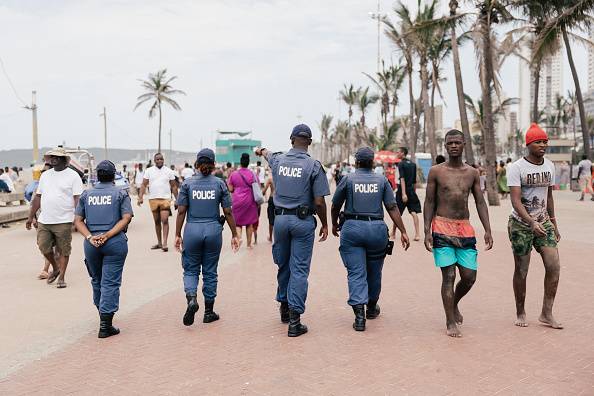








Discussion about this post